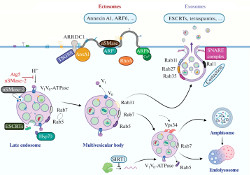Extracellular vesicles (EVs) are a new and actively developing area of modern experimental and theoretical biology, which attracts researchers primarily by the possibility of using EVs as diagnostic biomarkers and therapeutic agents. Currently, the largest amount of data has been accumulated on small extracellular vesicles (sEVs) - exosomes, vesicles of endosomal origin, and ectosomes (formerly known as microvesicles), which are a product of direct budding from the plasma membrane. In a recent review, authors from the IHNA&NPh RAS and the Moscow Research and Clinical Center for Neuropsychiatry examine the main stages of the biogenesis of exosomes and ectosomes, the main processes of intracellular membrane traffic, as well as signaling with the participation of sEVs. In addition, the authors discuss the role of sEVs in the physiology and pathophysiology of the nervous system, as well as many promising aspects of studying the biology of sEVs.
* e-mail:
Key words: small extracellular vesicles, exosomes, ectosomes, ESCRT, SNARE, Rab GTPases, signaling, endolysosomal system, multivesicular bodies, membrane traffic, intercellular interaction
